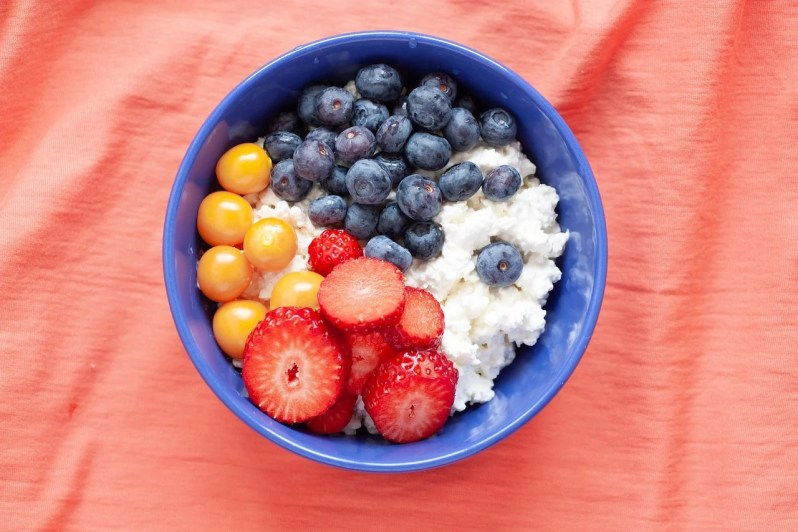Cottage cheese once had a bad reputation — known as a lumpy and poor-tasting “diet food” often associated with the low-fat diets popular in the 90s. While this food was once considered “something Grandma has for breakfast,” recent nutrition trends have brought to like how beneficial cottage cheese truly is. Jam-packed with protein, low in calories, and featuring a mild flavor, cottage cheese serves as a versatile ingredient for many breakfast recipes. These four cottage cheese breakfast ideas are destined to change your mind about this delicious high-protein food.
Avocado cottage cheese toast

Avocado toast is a delicious breakfast classic that contains healthy fats and carbs and is super simple to make. Similarly, avocado cottage cheese toast elevates your morning avocado toast with extra protein to fuel your morning. This high-protein variation on classic avocado toast features a layer of cottage cheese on the toast, topped with avocado and seasonings as desired. To give this cottage cheese breakfast a bit more flavor, add dill, bagel seasoning, lemon juice, or red pepper flakes for a spicy kick.
Using just half a cup of 4% milkfat cottage cheese offers so much nutrition in this easy breakfast, including healthy levels of calcium, phosphorous, vitamin B12, riboflavin, and selenium. We love the mixture of healthy fats, carbs, and proteins that are combined in this quick breakfast recipe.
Ingredients
- 2 pieces whole wheat sourdough bread
- 1/2 cup cottage cheese
- 1/2 an avocado, peeled and sliced thinly
- Juice of half a lemon
- 1 tbsp fresh dill, chopped
- 1/4 tsp red pepper flakes
- Pinch of sea salt flakes
Method
- Toast the bread in your toaster to your desired doneness.
- Spread about 1/4 cup of cottage cheese in a layer onto each piece of toast.
- Top the cottage cheese with avocado slices.
- Squeeze lemon juice on top of the avocado slices, and sprinkle with chopped dill, red pepper flakes, and sea salt flakes.
Apple cinnamon cottage cheese bowl

Have a bit of a morning sweet tooth? This apple cinnamon cottage cheese bowl can be whipped up in just five minutes and adds a slight touch of sweetness to cottage cheese by using a dash of cinnamon and maple syrup. The crunchy walnuts in this cottage cheese breakfast add a unique element of crunchiness to the bowl. If you find you don’t like the sourness of cottage cheese, this recipe’s sweetness is perfect to balance out the taste.
Ingredients
- 1/2 cup 2% cottage cheese
- 1/2 apple, chopped
- 1 tbsp chopped walnuts
- 1 tbsp maple syrup
- 1 pinch cinnamon
Method
Everything seasoning cottage cheese English muffin

If you’re looking for savory cottage cheese breakfast ideas, this everything-seasoning cottage cheese English muffin is for you. This low-calorie breakfast has a healthy balance of carbs and protein that will keep you full until lunchtime. The toasted English muffin combined with the cold cottage cheese makes for a great combination and an easy breakfast to take on the go.
Ingredients
- 1/2 cup of cottage cheese
- Everything bagel seasoning
- 1 English muffin, toasted
Method
- Split the English muffin and toast to the desired level.
- Set toasted English muffins on the plate and spread 1/4 cup of cottage cheese on each half.
- Sprinkle a small dash of everything bagel seasoning on each half.

Cottage cheese eggs
Did you know that cottage cheese blends beautifully into eggs? Combining cottage cheese into your eggs before cooking is a quick breakfast hack to enhance the protein content of your breakfast. Cottage cheese makes your eggs creamy, soft, and fluffy and can be added to scrambled eggs or omelets to supercharge your breakfast. With only 2 carbs and 16 grams of protein, these cottage cheese scrambled eggs are the perfect breakfast for any high-protein or low carb diet.
Ingredients
- 1 tbsp butter
- 4 eggs, beaten
- 1/4 cup cottage cheese
- 1 tsp chopped fresh chives
- ground black pepper
Method
- Gather all ingredients.
- Melt butter in a skillet over medium heat. Pour beaten eggs into the skillet; let cook undisturbed until the bottom of the eggs begins to firm, 1 to 2 minutes.
- Stir cottage cheese and chives into eggs and season with black pepper.
- Cook and stir until eggs are nearly set, 3 to 4 minutes more.
Discovering your favorite cottage cheese breakfast

Ditch your preconceived notions from the past about cottage cheese and give these unique cottage cheese breakfast ideas a chance. Whether you’re looking for a classic egg breakfast such as cottage cheese eggs or something a bit sweeter like the apple cinnamon cottage cheese bowl, hitting your protein macros has never been easier when you add cottage cheese to your favorite breakfast recipes.




